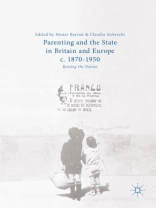This innovative collection draws on original research to explore the dynamic interactions between parents, governments and their representatives across a range of European contexts; from democratic Britain and Finland, to Stalinist Russia and Fascist Italy. The authors pay close attention to the various relationships and dynamics between parents and the state, showing that the different parties were defined not solely by coercion or manipulation, but also by collaboration and negotiation. Parents were not passive recipients of government direction: rituals and cultures of parenting could both affirm and undermine state politics. Readers will find this collection crucial to understanding family life and the role of the state during a period when both underwent significant change.
İçerik tablosu
1. Hester Barron and Claudia Siebrecht, Introduction: Raising the Nation.- 2. Siȃn Pooley, Parenthood, Citizenship and the State in England, c. 1870-1914.- 3. Katja Haustein, The ‘Breastfeeding Crisis’: Parenting, Welfare Policies, and Ideology in Imperial Germany, 1871-1914.- 4. Daniel J. R. Grey, Parenting, Infanticide, and the State in England and Wales, 1870-1950.- 5.Sarah-Anne Buckley, Parenting, Poverty and the NSPCC in Ireland: 1889–1939.- 6.Claudia Siebrecht, ‘I looked after the State, but the State is not Looking after Me’. Parenting and the Population Crisis in First World War Germany.- 7. Hester Barron, Parents, Teachers and Children’s Well-Being in London, 1918-1939.- 8. Kaisa Vehkalahti, Notions of Parenting and the Home in the Institutional Care of Delinquent Girls in Finland, 1920s-1940s.- 9. Kate Ferris, Parents, Children and the Fascist State: the Production and Reception of Children’s Magazines in 1930s’ Italy.- 10. Suan Sheridan Breakwell, ‘Knowing how to be a Mother’: Parenting, Emotion and Evacuation Propaganda during the Spanish Civil War, 1936-39.- 11. Olga Kucherenko, In Loco Parentis: Junior Cadet Schools as an Instrument of State Parenting in the Soviet Union during the Second World War.- 12. Jelena Batinić, Motherhood and the Yugoslav Communist State in the Revolutionary Era, 1943-1953.
Yazar hakkında
Hester Barron is a Senior Lecturer in History at the University of Sussex, and is especially interested in the themes of identity, community, childhood, parenting and schooling. Her previous publications include The 1926 Miners’ Lockout: Meanings of Community in the Durham Coalfield (2009).
Claudia Siebrecht is a Senior Lecturer in History at the University of Sussex, with interests in the cultural history of war and violence in 20th century Germany and Europe. Her previous work includes The Aesthetics of Loss: German Women’s Art of the First World War (2013).












